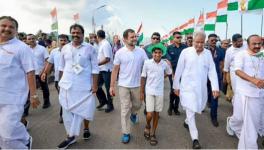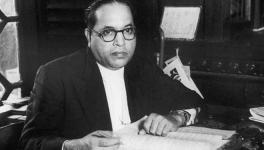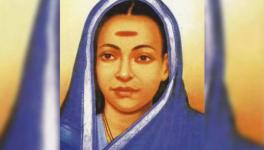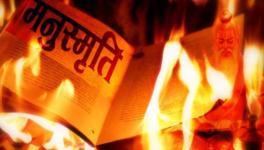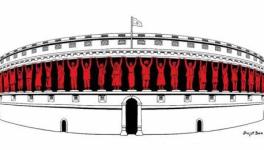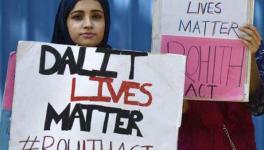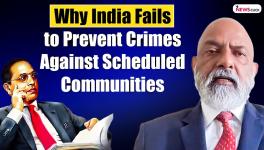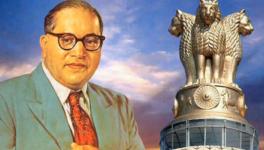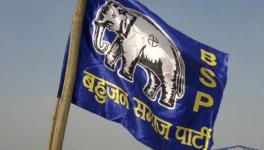How Can India Reinvigorate Phule’s Revolutionary Legacy?
Who will reinvigorate Phule’s legacy? This question stares us in the eye on 28 November, the 130th death anniversary of Jyotirao Phule, considered the “father of social revolution in India”. Phule largely remains relegated to the background—a result of selective amnesia and identity politics in modern India, where his path-breaking contributions, and those of his wife Savitribai and her fellow traveller Fatima Sheikh are rarely remembered.
They are credited with opening the first school for girls from the historically “untouchable” communities in Pune, which was once ruled by the Peshwas. This school created an upheaval in the Brahmin-dominated Maharashtra of yore, as a 14-year-old Muktabai, belonging to the formerly “untouchable” Mang caste, who studied in the school, wrote: “O learned Pandits, wind up the selfish prattle of your hollow wisdom and listen to what I say.” The student’s essay was published in 1855 in Dnyanodaya, a journal popular then. (From Women Writing in India, Edited by Susie Tharu and K Lalitha, Pandora.)
Jyotirao Phule was given the honorific of “Mahatma” a few years before he breathed his last in 1890, for a life spent engaging in tremendous innovation and creativity. He initiated his wife into writing and she later became an independent activist too—a rarity in those days. He opened the doors of his home for those considered the lowliest among the low. He came to the defence of scholar-activists, such as Pandita Rambai, when she embraced Christianity. So he fought against the conservative onslaught single-handedly. Many such instances in his life are worth emulating today.
Phule had the courage to question, challenge the understanding of his colleagues, and never went with the established dicta of the day. He wrote a critique of his comrade Bhalerao on questions of gender equality and patriarchal oppression. He published “Cultivators Chord” independently, while another legendary figure, Lokhande, who pioneered the first workers union in Bombay [now Mumbai]. The “Bombay Mill Hands Association soon turned out to be “too radical” for its own time.
In his introduction to Selected Writings of Jotirao Phule, GP Deshpande tells us:
“Phule’s canvas was broad, his sweep majestic. He identified and theorised the most important questions of his time—religion, Varna system, ritualism, language, literature, British rule, mythology, gender question, conditions of production in agriculture, the lot of peasantry etc… Was Phule then a social reformer? The answer will be, “no”. A social reformer is a liberal humanist. Phule was more of a revolutionary. He had a complete system of ideas, and was amongst the early thinkers to have identified, in a manner of speaking, classes in Indian society. He analysed the dvaivarnik structure of Indian society, and identified the shudra-atishudras as the leading agency of a social revolution.” (p. 20, Leftword.)
After his demise, though, the Phulevian legacy lost its critical edge and for this the blame lies with the ruling classes. Their formal glorification of the great figures from the past apart, the ruling classes are neither bothered about the real concerns raised by Phule, nor by other social revolutionaries. This is because Phule would raise destabilising questions about nation, nationalism and culture and challenged the “tremendous fascination among the elite of their times about our great civilisation”. One of his key posers on our caste ridden society was that since it is based on privileges for a few and disabilities for everybody else, therefore it is nearly impossible for “a nation” to emerge from its midst.
There cannot be a “nation” worth its name until all people of the land of King Bali, such as the Shudras and Ati-shudras, Bhils (tribals) and fishermen, etc, become truly educated and are able to think independently, and are uniformly unified and emotionally integrated. If a tiny section of the population like the upstart Aryan Brahmins alone were to found the “National Congress” who will take any notice of it ? (Phule, Collected Works, Vol-II; 29.)
It be said that a gap between Phule’s world-view and the social base of the movement he led became apparent over time, and there was a strong conservative reaction to his cultural revolt from the dominant castes.
It is important to remember that the economically-dominant Maratha community was keen on gaining Kshatriya status rather than identifying with the ritually “lower” caste groups and ignored Phule’s opposition to Sanskritisation. (As recorded by Rosalind O’Hanlon in Caste, Conflict and Ideology, p. 276). Affluent Maratha chiefs had remained aloof from Phule’s movement, while others, like Bhau Rangari, assisted Lokmanya Tilak to undermine Phule’s ideas. (Raminder Kaur, Performative Politics and the Culture of Hinduism, Permanent Black, 2003, pp 38-40.)
After Phule’s death, there was an incident in which the Dalits—Mahars, Chambhars and Dhors—were barred from attending a meeting in Bhavani Peth on grounds of their caste. (Parimala Rao, Foundations of Tilak’s Nationalism, p. 14). In fact, the unfolding national movement was negatively impacting the social reform agenda. In his address delivered on the 101st birthday celebrations of Justice MG Ranade, a contemporary of Phule, Dr BR Ambedkar throws light on this:
The decline of social reform was quite natural. The odium of social reform was too great. The appeal of political power too alluring. The result was that social reform found fewer and fewer adherents. In course of time the platform of the Social Reform Conference was deserted, and men flocked to the Indian National Congress. The politicians triumphed over the Social Reformers. I am sure that nobody will now allow that their triumph was a matter for pride. It is certainly a matter of sorrow. Ranade may not have been altogether on the winning side, but he was not on the wrong side and certainly never on the side of the wrong as some of his opponents were” he said in the address, titled Ranade, Gandhi and Jinnah, delivered on 18 January 1943.
Looking back, it is clear that the voices of internal reform started being sidelined during Phule’s time itself. Tilak, a key Congress leader, had vehemently led the conservative reaction against the concerns Phule stood for. It is because of his insistence that the tradition of holding a social conference after the Congress conferences was discontinued. Tilak’s opposition to the Sharda Act is also known, where he opposed British intervention in deciding the age at which girls can marry.
The other face of Tilak’s work was that he firmly opposed education of girls and women, and the social reformers and revolutionaries who challenged age-old traditions. On many of these, he exhibited a clear-cut Brahmanical bias, which has not received the attention which it has deserves.
In a voluminous work, Foundations of Tilak’s Nationalism by Parimala Rao (Orient Blackswan, 2010) the author relies on ‘The Mahratta’ the newspaper brought out by Tilak, to raise important questions which demonstrate the hiatus between his image and the reality. She writes in the introduction, “Encountering the Myth”, “Why did Tilak’s 25 year long anti-peasant struggle fail to enter the pages of history while his token no-tax campaign in ryotwari areas has been extolled? Why is his 40 year long effort to stop women and non-Brahmins from receiving education pushed under the carpet?”
In fact, Tilak’s ideological opposition to Phule went to the extent that the ‘Mahratta’ and ‘Kesari’, his other newspaper, did not even publish the news of his death in 1990. He glossed over how when he was jailed for the first time, it was Phule who organised a public felicitation programme when he was released in 1881.
Tilak’s image as the “militant” face of the nationalist movement, as opposed to the “moderates: has been glorified, but his problematic ideas and actions regarding the Dalits and women, and his anti-Muslim bias, have also never come under the scanner.
Today, once again, forces fighting for equity, democracy, secularism are finding themselves under siege. In this ambience, Phule’s teachings, how he faced challenges are a window of opportunity. Phule’s sociocultural work, often referred to as a “cultural revolt in a colonial society”, anticipates the workings of right-wing forces—whether Hindutva or Islamist—and for this reason too they are worth emulating.
Phule’s agenda was indeed adopted by Ambedkar and some other social revolutionaries, but by now it has largely been forgotten, even by those who claim allegiance to it. And the Right is swiftly taking over this legacy. The RSS and/or Jamaat-e-Islami and other status quoist and reactionary bodies have an exclusivist agenda which they try to bolster through interventions in the cultural sphere, in a strategic manner.
Phule’s critique of religion and caste and his daring to stand apart and be counted, his interest in agriculture, education, his proposal to the British government on prohibition, his flair in writing—many many aspects of his life and struggle need further study and emulation.
The author is an independent journalist. The views are personal.
Get the latest reports & analysis with people's perspective on Protests, movements & deep analytical videos, discussions of the current affairs in your Telegram app. Subscribe to NewsClick's Telegram channel & get Real-Time updates on stories, as they get published on our website.









